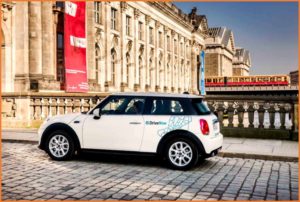With the very legality and social acceptance of the automobile under attack in the EU – and notably Germany the home of the non-horse machine – BMW Group and Daimler AG are linking to offer customers a “single source for sustainable urban mobility services.” The two companies today signed an agreement to merge individual mobility services business units, if regulators – aka competition authorities who generally bow to companies from Europe’s largest economy – allow. No one knows what the future of mobility will bring, but the latest merger – and the consolidation is ongoing – that it will be expensive to implement. Both brands claim their rolling stock will remain unique.
The new front in the transportation of the future fight in cities and mini-cities will be soldiered by CarSharing, Ride-Hailing, Parking, Charging and Multimodality troops. Each company will hold a 50% stake in a joint-venture made from both companies’ current mobility services. It is alleged that the two companies will remain competitors in their respective core businesses, something the capital markets and ultimately customers will weigh in on. If mobility is the point, who cares how you are mobile or what the vehicle’s hood ornament and badging are.
The aim of this transaction is to become a leading provider of expensive and sometimes unknown innovative mobility services. Both automotive manufacturers aim to shape the mobility of the future by offering their customers “unique experiences,” thereby working their partners or opponents, such as cities and communes, in achieving sustainable urban mobility.
Together, the BMW Group and Daimler AG plan to grow this new business model sustainably and enable rapid global scaling of services. Working as partners, both companies are thereby addressing the challenges arising from urban mobility and changing customer wishes, and cooperating with cities, municipalities and other interest groups to improve quality of life in major cities. The merger will promote electromobility, for example, by offering electrified CarSharing vehicles, as well as “easy access to charging and parking options.” As a result, it should become e easier to use sustainable mobility services.
“The BMW Group is shaping future mobility – and striking out in new directions to do so. Our Strategy Number One > Next provides the BMW Group with a roadmap to a digital and emission-free future,” claimed Harald Krüger, Chairman of the Board of Management of BMW AG. “We remain competitors when it comes to the best premium vehicles. The planned merger of our mobility services will pool our resources and sends a strong signal to our new competitors,” added Krüger.
“As pioneers in automotive engineering, we will not leave the task of shaping future urban mobility to others. There will be more people than ever before without a car who will still want to be extremely mobile. We want to combine our expertise and experience to develop a unique, sustainable ecosystem for urban mobility,” claimed Dieter Zetsche, field marshall, err, Chairman of the Board of Management of Daimler AG and head of Mercedes-Benz Cars. As always there’s a marketing and marching acronym here too CASE. CASE stands for connectivity, automated driving, sharing & services and electric mobility.”
The equally-owned joint venture combines services in five areas:
1) Multimodal and on-demand mobility with moovel and ReachNow: Intelligent and seamless connectivity between different mobility offerings – including booking and payment – will create significant added value for users. It will also offer possible solutions for the challenges of urban private transport.
2) CarSharing with Car2Go and DriveNow: Car2Go and DriveNow operate a total of 20,000 vehicles in 31 major international cities. CarSharing enables better utilization of vehicles and thus helps reduce the total number of vehicles in cities. More than four million customers already use these CarSharing services.
3) Ride-Hailing with mytaxi, Chauffeur Privé, Clever Taxi and Beat: With Europe’s largest taxi app, simply order a taxi or use a licensed driver in France for a ride in the French metropolises. In total, 13 million customers and some 140,000 drivers are already using the modern, practical and fast way of Ride-Hailing with mytaxi, Clever Taxi and Beat or private hire vehicle service Chauffeur Privé. Innovative offers such as mytaximatch, in which people not known to each other share a taxi at a fingertip, make an important contribution to reducing inner-city traffic by eliminating numerous individual trips in the urban space.
4) Parking with ParkNow and Parkmobile Group/Parkmobile LLC: Ticketless, cashless on-street parking or help finding, reserving and paying for off-street parking in a garage. Innovative digital parking services reduce the time and the amount of driving involved in finding a parking space. This will reduce traffic significantly, as cars searching for parking spaces currently account for around 30% of road traffic.
5) Charging with ChargeNow and Digital Charging Solutions: Easy access (incl. location, charging and payment) to the world’s largest network of public charging stations with more than 143,000 charging points worldwide. Combined with parking privileges in cities, this will support the expansion of electromobility, by helping people get to know this drive technology and integrate it easily into their mobility needs.
Follow the Money
The formation of the joint venture will produce a valuation and earnings effect at Daimler Financial Services. If the approval of the competition authorities is received this year, following adjustments will be made to the group outlook for Daimler AG: The company expects EBIT for Daimler Financial Services to be significantly higher than the previous year; for the Group as a whole, this means EBIT is likely to be slightly higher than the previous year.
The formation of the joint venture will trigger a one-time valuation and earnings effect in the BMW AG’s group financial statement and thus lead to an adjustment of the company’s guidance. Pre-tax earnings on Group level would increase slightly in 2018 compared with the previous year. The valuation and earnings effect would have no impact on the EBIT margin in the automotive segment.


